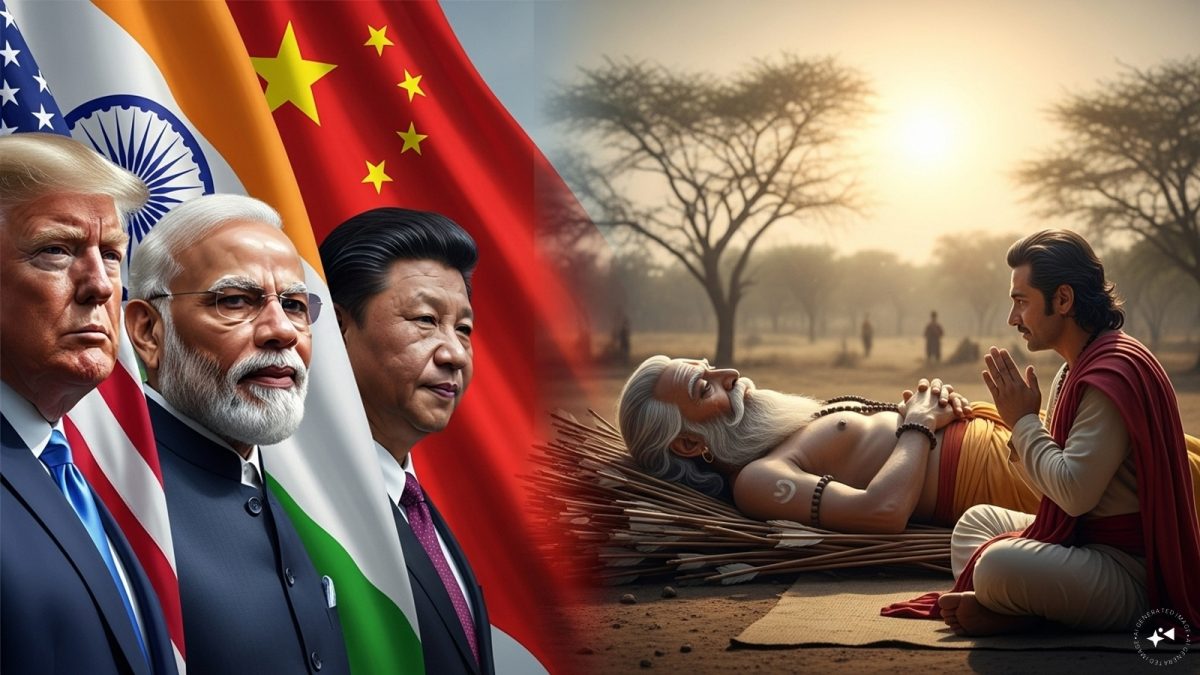At the foot of a grand banyan tree lived a mouse named Palit. Every night, a cat called Lomesh slept on its branches. There was also a hunter who often visited the forest, spreading his net in the evening and returning in the morning to collect his prey. One day, Lomesh was caught in the hunter’s net. Palit, who had long feared the cat, rejoiced. He could now roam freely, unafraid of being caught by the cat.
As fate would have it, Palit spotted a piece of flesh trapped in the same net. Tempted, he climbed up to nibble it—only to see a mongoose positioned near the net to strike him down and an owl glaring from above the branches. Death surrounded him. He couldn’t leave the net—Harin, the mongoose, would strike. He couldn’t stay—the owl would swoop. The only shelter was inside the net… beside Lomesh.
Palit decided to help Lomesh escape the net; in return, he wanted the cat to stand by him against the mongoose and the owl. Desperate, Lomesh agreed. The mouse slipped into the net. Seeing them together, the owl and mongoose withdrew. Safe for now, Palit began gnawing at the net—but slowly.
“Why don’t you hurry?” Lomesh demanded. When Palit showed no haste, the cat said, “Do you think I will be so ungrateful that I will attack the one who saved my life? I kept my side of the deal, trusting you fully, and now I expect you to reciprocate. Rest assured I will not harm you. I apologise to you for my past actions that may have caused you pain.”
Impact Shorts
More ShortsPalit replied, “Neither friends nor enemies are permanent. Even relationships are based on alignment of mutual interest. I have cut all the cords but one. As soon as the hunter appears, I will cut this one too, just in time to allow you to escape to save yourself.”
At dawn, the hunter arrived. Palit bit through the last thread. Lomesh fled for his life, and Palit vanished into his hole. The hunter returned empty-handed.
Later, Lomesh told Palit, “You have nothing to fear from me now.”
Palit answered, “Our friendship was born of fear. Such ties die when danger fades. Even if you mean no harm, what of your kin? Or your temper one day? He is prudent who knows when to strike an alliance, when to go to war, when to march and when to maintain the status quo. There are no permanent friends, no permanent enemies. We should not trust anyone blindly?”
This story, from the Mahabharata, is told when Bhishma lies on his bed of arrows soaked in blood, advising Yudhishthira on how a king should act in adversity.
Let us transpose the story to today’s geopolitics. Replace the mouse with Bharat, the cat with China, the hunter with the United States, the mongoose with Western European nations, and the owl with Pakistan or Turkey.
Donald Trump, the hunter, has cast his tariff-like net across the world. China, the cat, realises it is the main target. Bharat, the mouse, is initially happy in the turn of events but soon finds itself to be a target of the tariff-like net, surrounded by a watchful European mongoose and a mischievous Pakistani owl.
This shifting landscape forces Bharat and China to set aside their differences—temporarily—to withstand the American economic onslaught. They cooperate strategically, protecting each other’s interests for the moment.
Some foreign policy idealists argue that Bharat and China should remain friends forever. But Bhishma’s wisdom cautions otherwise: can the mouse truly trust the cat once the hunter is gone? The answer is an unequivocal “no”.
As Palit told Lomesh when the latter sought an all-time friendship after the hunter was gone, “We became friends only because both of us feared the danger facing us. Friendships forged between the weak and the strong due to mutual but situation-demanded need do not last once the situation changes. Hence, it is important for the weak to remain aware and cautious of the more powerful once the situation reverts to normal. Even if you keep your word, what will stop your family and friends from making me their food, especially if I am easily available to them? You may also harm me any time you are overcome by anger, ego or jealousy.”
Palit continued, “He is prudent who knows when to strike an alliance, when to go to war, when to march and when to maintain the status quo. There are no permanent friends, no permanent enemies. We should not trust anyone blindly?”
Bhishma’s counsel remains timeless: there are no permanent friends, no permanent enemies; only eternal interests endure. The path to Bharat’s rise lies through its ancient, enduring Sanatana wisdom.
P.S.: Palit’s tale is among the many from the Mahabharata. Author Ami Ganatra’s two-volume work—Mahabharata Unravelled and Mahabharata Unravelled II (Bloomsbury)—retells such stories with grace and simplicity, warmth and candidness. But if you have time, energy and patience to know in detail, then go for the Mahabharata itself. For, nothing tells the history of Bharat and its people the way the Mahabharata does.
Views expressed in the above piece are personal and solely those of the author. They do not necessarily reflect Firstpost’s views.
The author is Opinion Editor, Firstpost and News18. He can be reached at: utpal.kumar@nw18.com
)